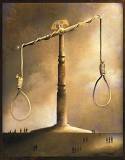 Gun control is a somewhat controversial issue. For some reason that I don't understand, it tends to follow party affiliation, with Republicans being more apt to oppose gun control laws, with Democrats more likely to favor gun control laws, and in even more extreme case, gun bans. I'd always been a bit torn on the issue, so I figured what better opportunity to research it than to write a blog entry about it.
Gun control is a somewhat controversial issue. For some reason that I don't understand, it tends to follow party affiliation, with Republicans being more apt to oppose gun control laws, with Democrats more likely to favor gun control laws, and in even more extreme case, gun bans. I'd always been a bit torn on the issue, so I figured what better opportunity to research it than to write a blog entry about it.
Let me start by saying that I'm not going to consider the Constitution at all. After all, the Constitution is just a piece of paper that's only worth how it's interpreted and enforced. The Supreme Court could suddenly decide that the clause about "a well regulated Militia" is fulfilled by the National Guard and doesn't protect private gun ownership, or they could go back to a pre-1920s interpretation where the Bill of Rights only applied to the federal government, or the House and Senate could even pass a Constitutional amendment repealing the second amendment. The Constitution and Bill of Rights are documents I like, but they're not scripture. They were still written by fallible men. So, I'm more interested in the underlying justification for gun ownership.
I'm also going to try to avoid some of the sillier arguments people use. For example, I've heard people bring up isolated cases of gun control, such as D.C.'s handgun ban, and pointing out how ineffective they are in reducing crime. But of course, when you can hop on the Metro and in 20 minutes be in a location where you can legally purchase a gun, the ban's not going to be very effective. Any cases worth considering have to be widespread enough to have a real impact.
The main issues to me seem to be:
- Just how dangerous are guns?
- Do gun control laws make society safer?
- If gun control laws do work, is it a trade-off in personal freedom vs. safety that we're willing to make?
So, how dangerous are guns? I guess it's time to start looking at the statistics.
I went to the CDC Deaths and Mortality section for some overall mortality stats, and was able to find stats for 2005-2007. I also went to the CDC Injury Mortality Reports site for firearm and other injury specific stats, which I found for the years 1999-2007.
| General Mortality Statistics |
| Stat |
Total Deaths, 2005-2007 |
Age-Adjusted Rate |
Avg. per Year |
| All Deaths |
7,297,993 |
not calc'd |
2,432,664 |
|
| General Injury Mortality Statistics |
| Stat |
Total Deaths, 1999-2007 |
Age-Adjusted Rate |
Avg. per Year |
| All Injury Related Deaths |
1,481,325 |
56.28 |
164,592 |
| Motor Vehicle, Overall |
400,993 |
15.24 |
44,555 |
| Homicide - All Causes |
161,747 |
6.14 |
17,972 |
| Homicide - non Firearm |
55,622 |
2.12 |
6,180 |
| Homicide - Firearm |
106,125 |
4.02 |
11,792 |
|
| Firearm Specific Injury Mortality Statistics |
| Stat |
Total Deaths, 1999-2007 |
Age-Adjusted Rate |
Avg. per Year |
| Firearm - All |
269,871 |
10.24 |
29,986 |
| Firearm - Suicide |
152,056 |
5.77 |
16,895 |
| Firearm - Unintentional |
6,587 |
0.25 |
732 |
| Firearm - Homicide |
106,125 |
4.02 |
11,792 |
| Firearm - Legal Intervention |
2,891 |
0.11 |
321 |
| Firearm - Undetermined |
2,212 |
0.08 |
246 |
Okay, so what does that tell us? First of all, I think it's important to separate out the suicides from other gun related deaths, since someone wanting to commit suicide will find a way to do so, and the method of choice isn't much of a deterrent. [Edit: Actually, that's not necessarily true. There's a very informative article, The Urge to End It All, that discusses how many suicides are actually impulsive, not premeditated. Those impulsive suicides could be reduced with gun control.] So, once you do that, there are around 13,091 gun related deaths per year, with 11,792 of those being homicides, and only 732 being accidents.
To start, let's just look at that 732 accidental deaths per year due to guns, since those are the deaths of innocent people that can be attributed to people using their guns legally. Given that the U.S. population is around 300 million, that's a really small number. It's much smaller than the deaths due to motor vehicles. Perhaps an even better comparison is that in the year 2000, 567 people died from drowning in pools (source).
So, at least from that standpoint, I don't think it's worth banning guns. I'd put that in the category of acceptable risk. However, I wouldn't be against reasonable legislation that would help reduce that risk (i.e. gun safes, trigger guards, etc. - though I don't know enough about those methods to comment on them). Going back to the pool comparison, it's like the legislation that requires you to have a fence around a pool - not a big deal.
However, there are still nearly 12,000 homicides committed each year with guns. That's not huge, but it's still big enough to be troubling. It's roughly 7% of the injury related deaths in the U.S. per year, but only around 0.5% of the total deaths. One interesting point is that there are roughly 6,200 homicides each year that don't involve guns. Now, it's important to remember that most guns are purpose built killing machines*, and they're really damn good at it (or else we'd equip soldiers with some other type of weapon), but in close quarters one on one confrontations - the type likely to be involved in assaults or home burglaries - weapons such as knives can also be used. So currently, gun related homicides are double those of non-gun related homicides, but if guns were to magically disappear tomorrow, you can bet that quite a few criminals would switch to carrying around other weapons, and that the non-gun related homicides would increase.
Also, a common point made by gun rights advocates is that it's criminals committing murders, not law abiding citizens, and that criminals won't respect gun control laws. And for a certain segment of criminals, that's certainly the case, especially those involved in organized crime. However, for petty thieves or crimes of passion, a hypothetical gun ban may have some effect in keeping guns out of their hands, reducing those criminals' danger by forcing them to use less effective weapons.
But all that's starting to get a little too hypothetical. Are there any stats on this? Unfortunately, it's hard to find. The biggest problem is that compared to other prosperous democracies, the U.S. is just so violent. For example, in 2004, the intentional homicide rate in the U.S. was 5.5 per 100,000 people. In our neighbor to the North, Canada, it was only 1.95. In the United Kingdom, it was only 1.75. In Australia, it was only 1.5. And in Austria, it was only 0.72**. Obviously, not all of those murders can be attributed to guns, especially considering my discussion above where around 1/3 of homicides in the U.S. currently don't involve firearms, and where non-gun homicides would likely increase if guns were to disappear. But it shows that the U.S. isn't comparable to other prosperous democracies when it comes to homicides.
Australia is often cited in discussions on gun control laws due to their gun buy back program from a few years ago. The problem is, Australia's situation wasn't analogous to the U.S. prior to the program, since they already had more restrictive gun control laws, and the buy back program wasn't a full ban - it only banned certain types of guns. And there's still the point that violence in Australia wasn't as bad as in the U.S., so it's not an apples to apples comparison. So, whether you listen to the people cherry picking data to try to make it look like violent crime has increased dramatically in Australia after the program, or the people who point out that in the longer term that violent crime has decreased in Australia since the program, it still doesn't tell you what would happen in the U.S. if very strict gun control laws were passed.
I have one last bit of discussion before wrapping this all up - anecdotes. I know, anecdotes aren't data, but this is a blog, so I think they're permissible. I've known of two people who have had to defend themselves with guns. One was the father of a friend. The other was the neighbor of a relative. So, I haven't heard the stories first hand, but I'm not too far removed.
In one case, a criminal was trying to break into a home by attempting to knock down the front door. The man of the house heard what was going on, got his shotgun (or rifle - I can't quite remember), and shouted a warning. The criminal continued to try to break in. So, the homeowner shot through the door, shooting the criminal. It turned out to be an addict high on something. I think the homeowner did the right thing, especially in retrospect. If someone was acting violently, and didn't heed a warning, who knows what they would have done once they were in the house?
In the second case, a young man somehow got crossways with a local gang. I've only heard a one-sided second hand version, but he claims he was just attempting to buy some pot when the dealers tried to mug him, and he embarrassed them by actually stealing their guns and getting away. Whatever the case, several of the gang members showed up at his house at night, and broke in through the front door. The young man was shot several times, and one of the gang members was shot with a shot gun. Had he not shot back with a shot gun, what would have happened?
So, those are two examples I know of where guns were used in self defense. The first example, especially, is a legitimate example of a law abiding citizen who very likely might have been harmed had he not had a gun.
Okay, so let me go back to my three original questions.
1. Just how dangerous are guns?
As far as legal uses - not too bad. The number of people killed accidentally by guns is about the same as people who die accidentally in swimming pools. That's a level of risk I'm willing to live with.
As far as murders - guns are used to commit homicides twice as often as other methods, but those homicides account for less than 1% of the deaths in the U.S. per year.
2. Do gun control laws make society safer?
Honestly, I don't know. I haven't seen any good examples to point one way or the other. I'm sure some types of gun control laws work to reduce accidents, but I don't know about strict gun control laws or bans. My gut feel is that in the absence of guns, certain criminals would switch to other weapons and still commit murders, but it's probable that the murder rate would go down at least somewhat.
3. If gun control laws do work, is it a trade-off in personal freedom vs. safety that we're willing to make?
Without being able to quantify the first part of that, it's hard to define what that trade-off would be. As I've mentioned, I think there would be some small decrease in violence. Certain types of criminals (petty thieves, crimes of passion) would be without guns to carry out their crimes, but that would be partially offset by some of those switching to other, though less effective, weapons. Other types of criminals, especially those in organized crime, wouldn't be as affected by gun control laws. And all this must be balanced against law abiding citizens losing a freedom, and the potential ability to protect themselves.
I haven't seen enough data to indicate that gun bans or strict gun control laws would markedly reduce violent crime, and I would hate to take away people's freedoms out of fear. That's not to say I'm against gun control laws entirely. Things like gun safes, trigger guards, etc., while I can't comment on the individual methods, seem like reasonable precautions that don't unduly affect people's freedom.
So, all in all, I would prefer to err on the side of freedom in this, and only pass minimal gun control laws that keep society safer, but not go so far as to ban guns or anything close to that extreme.
*I know, I know. Many people like to go target shooting. But most of my personal acquaintances go target shooting mainly to stay in practice for hunting or self defense - the primary function of their guns is still to kill something.
**I chose 2004 because the data is available for many countries for that year - the rates have fluctuated slightly since then. Also, to put that into worldwide perspective, the highest rate in 2004 was Jamaica at 54, and the highest rate listed on that Wikipedia page was 71 for El Salvador in 2009. Though Jamaica and El Salvador aren't prosperous democracies, and not the societies I'd think the U.S. should emulate.
 With the uproar over the execution of Troy Davis, it's gotten me thinking of capital punishment. In short, I oppose it.
With the uproar over the execution of Troy Davis, it's gotten me thinking of capital punishment. In short, I oppose it.

 I've been way too busy this week to write a good blog entry. So, I'll just post something a bit thought provoking.
I've been way too busy this week to write a good blog entry. So, I'll just post something a bit thought provoking. There's an abandoned convenience store near the entrance to the development I live in. Just recently, we found out that someone's planning to buy it and make it an active store again. But, we also have a church nearby, and somebody asked if there was a problem with a store selling alcohol (beer & wine) being so close to a church. Somebody else in the neighborhood pointed out the
There's an abandoned convenience store near the entrance to the development I live in. Just recently, we found out that someone's planning to buy it and make it an active store again. But, we also have a church nearby, and somebody asked if there was a problem with a store selling alcohol (beer & wine) being so close to a church. Somebody else in the neighborhood pointed out the  Okay, I've been blogging an awful lot about politics recently, but here's one more. I'm going to mention an article titled
Okay, I've been blogging an awful lot about politics recently, but here's one more. I'm going to mention an article titled  Gun control is a somewhat controversial issue. For some reason that I don't understand, it tends to follow party affiliation, with Republicans being more apt to oppose gun control laws, with Democrats more likely to favor gun control laws, and in even more extreme case, gun bans. I'd always been a bit torn on the issue, so I figured what better opportunity to research it than to write a blog entry about it.
Gun control is a somewhat controversial issue. For some reason that I don't understand, it tends to follow party affiliation, with Republicans being more apt to oppose gun control laws, with Democrats more likely to favor gun control laws, and in even more extreme case, gun bans. I'd always been a bit torn on the issue, so I figured what better opportunity to research it than to write a blog entry about it. It's that time of month again when I go looking at the server logs to see how popular pages on this site are. Things are pretty consistent with months past. There were, however, two pages to the top 10 list that hadn't made it before -
It's that time of month again when I go looking at the server logs to see how popular pages on this site are. Things are pretty consistent with months past. There were, however, two pages to the top 10 list that hadn't made it before -